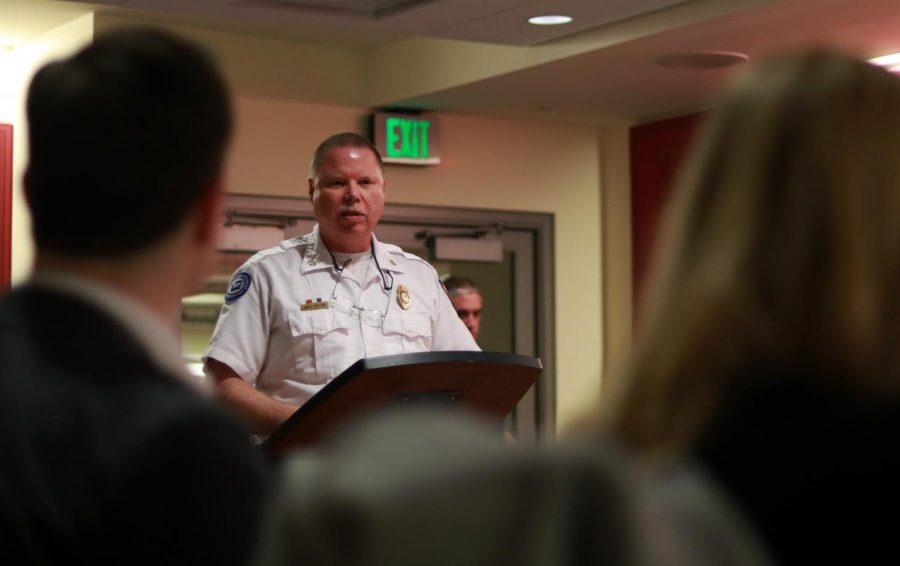Pullman Fire department updates ASWSU
Senate again rejects bill to raise minimum GPA for senators
Oliver McKenna | The Daily Evergreen
Pullman Fire Chief Mike Heston presents the fire department’s plans for 2018 to the ASWSU Senate on Wednesday in the CUB.
January 11, 2018
The Pullman Fire Department is looking at locations in the city to build a third fire station and hopes to increase the number of first responders.
Pullman Fire Chief Mike Heston and Captain Mark Johnson presented the department’s strategic plan to the ASWSU Senate at its meeting Wednesday night. The plan, which is updated roughly every five years, outlines the department’s long-term goals and direction.
Pullman’s growing population, combined with the closing of the WSU Fire Department, has strained the department’s resources.
“In 2004,” Johnson said, “there were two separate fire departments that served the population we are serving with one fire department now.”
There are currently two Pullman fire stations, one on S. Grand Avenue and one on NW. Terre View Drive. The two stations divide the city and the WSU campus roughly in half, so the staffs of each can respond to calls in a shorter amount of time.
“We want to make sure we maintain a three- to four-minute travel response time,” Heston said. “As the city gets bigger, that gets to be a challenge.”
Heston said the number of calls has been rising steadily over the past few years. In 2004, Pullman’s population was about 24,000 people and department personnel responded to about 2,100 calls. The city had three stations, four fire engines, five ambulances and 24 full-time staff.
Now, Pullman has only two stations and two engines. The department maintains five ambulances and 30 full-time staff, 16 of which are paramedics. The city’s population grew to about 33,000 people and the department responded to between 2,900 and 3,900 calls in 2017.
“Calls for service have been going up each year,” Johnson said.
In order to cut travel time, the department is considering multiple locations for its new station, including the northeastern part of town. Johnson said the department started looking into a new station in 2010, but the poor economy shut down the discussion. A future city bond could put money toward buying property for a new station.
Heston said hiring new personnel is a department priority; it is up to the city to invest money out of its general fund to pay for new fire department resources.
“It’s up to the city council deciding where that money goes,” Johnson said.
Fire protection class is a system that ranks a community’s fire protection for insurance purposes. A score of one is excellent, while a score of 10 shows there is almost no protection. Johnson said that in 2004, Pullman had a score of four. In 2017, that score declined to a five and insurance rates went up.
Heston said a large portion of calls the department responds to are students. About 21 percent come from the WSU campus and about 25 percent from College Hill. Johnson said most of the calls they receive are alcohol-related.
“Eighty percent of our calls throughout the city are EMS calls,” he said. “The vast majority on Greek Row and campus are alcohol-related problems.”
ASWSU senators voted against a bill that would raise the minimum GPA for senators from 2.3 to 2.5. Sen. James Dalton said the jump from 2.3 to 2.5 was not enough.
“I 100 percent understand raising the standard,” he said, “but I just think that this was kind of just thrown together.”
The same change was proposed last semester, but failed by one vote. Some on the Senate said grades were not a fair way to measure leadership skills.
Sen. Devon Holze said freshman senators would be hit hardest if the bill passed.
“As we all know, freshman year is the hardest year academically for students,” she said.
Sen. Savannah Rogers was in favor of the bill and said it would push ASWSU senators to better themselves.
“I just don’t understand why we as leadership of the entire student body are trying to hold ourselves to a lower standard,” she said.
The bill failed eight to six. It needed at least 10 votes to pass.









